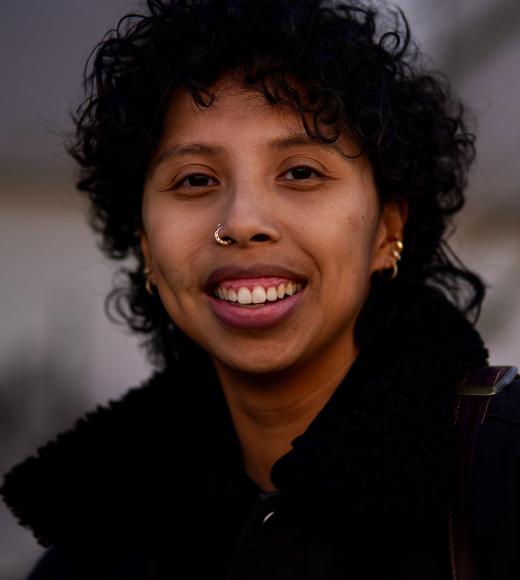“Thinking Food” with English PhD Candidate Stacey (Thùy) Anh Baran

English Literature Ph.D. candidate Stacey (Thùy) Anh Baran is currently a graduate fellow in the Mellon Foundation Sawyer Seminars under the Thinking Food at the Intersections initiative. The year-long initiative “unearths the systemic roots of food inequity through humanities-based programs: bridging cultural histories, current realities, and public imagination” supported by a $250,000 Andrew W. Mellon Grant. Stacey is part of a group of faculty, postdocs, and graduate students across UC Davis interested in the cultural study of food through multi-day colloquia, conversations, reading groups, publishing opportunities, and, of course, food.
Stacey is the producer and editor of Esculent, a podcast featuring conversations with chefs, historians, artists, and others – recorded in the English Department podcast room. Recent guests have included Chefs Norma Listman and Saqib Keval, owners of Masala Y Maiz (featured on Netflix’s Chef’s Table) and Dr. Shantel George, University of Glasgow historian of West African spirituality in food history. While an interview is conducted by co-fellow Elizabeth Queen, Stacey facilitates the tech and recording, followed by post-production editing.
“What's important about the role of any editor is that they have so much control over how something is presented and narrativized to an audience. There's an added layer of constructing a narrative and a conversation that editing permits and requires. It's really fun to have a subtle, almost invisible hand in shaping a story in this way.”
Moderating panels, in a way, also allows for assistance in shaping the stories of those that are present. In a recent colloquium, Thinking Food: Reimagining the Past through Food Justice, Stacey moderated a panel entitled, “Narrating Food’s Past: Diaspora, Immigration and Globalization,” which included filmmaker Ebony Bailey, chef Martin Draluck, and mezcal educator Fabiola Santiago. Stacey considered the ways in which to tie their knowledge together, how their different mediums of creativity and instruction – filmmaking, cooking, group learning – could pose and answer questions on how they view themselves in the context of food justice.
Stacey’s own research reflects her interest at the intersection of food studies, film history, and national identity. Her dissertation, “Mythmaking Maize: The Troubled Iconicity of Corn in American Horror,” examines the appropriation of maize (corn) in culturally significant American horror films and challenges the dominant narratives of national cinema.
“I pursue a historiographic examination of the horror genre, arguing for maize’s iconographic role as a food crop which anchors the homogenizing concept of national identity and its mythos. My project utilizes the close reading methods of contemporary film genre theory, along with representational and cultural methodologies from food studies, to examine the hauntological associations of agricultural colonialism, Indigenous erasure, and monoculture anxieties that emerge cinematically through the image of maize.”
Much of her research is home to the English department, its roots in humanistic approaches to food studies and representations in film, focusing on conceptual approaches to spatiality, region, and culture. However, Stacey’s engagement with food began from a very grounded and material perspective beginning at the age of 16 working in kitchens.
“I grew up and lived in Rochester, NY, where I worked at dedicated pizzerias, ‘gastropubs,’ dive bars, upscale Italian fine dining places, and cocktail bars. I've done hot line, garde manger, chef de cuisine, pastry, and I've also been a day baker at a bakery. I've always been in the back of house.”
In her experience, she discovered the intertwining of time and labor, a concept rooted in the Thinking Food initiative.
“It's such a different experience to ‘clock in’ for a shift and be able to clock out when compared to, say, doing research, where it feels like you're never really not thinking about your work. But at the same time, as a chef I was always thinking about menus, new recipes, inventory, what I had to do the next day, and so on... I guess you never really clock out of work when it's that integral to your life, no matter what you do.”
With support from faculty & staff members, both in the English department and across the university, she has been creating an intersection of theoretical frameworks with material food practices, supporting the university’s next chapter in food studies.
When asked what favorite texts she uses to get people thinking about literary representations of food, she noted two works.
“For literature: Ruth Ozeki's My Year of Meats, a fascinating exploration of cross-cultural understandings of food, animal flesh, and gendered expectations around eating and cooking. For film: undoubtedly Soylent Green (1973), which in some ways is barely even about 'food' in the strictest sense.”
